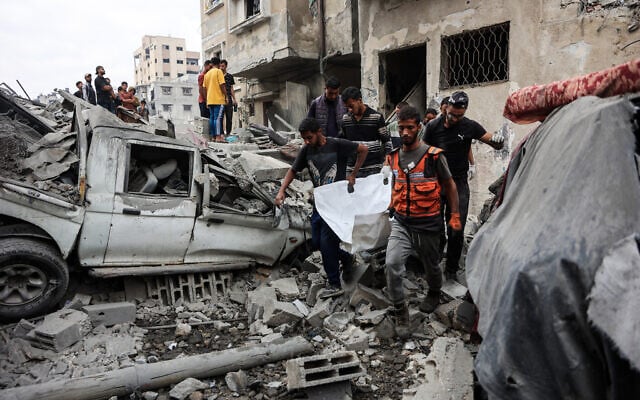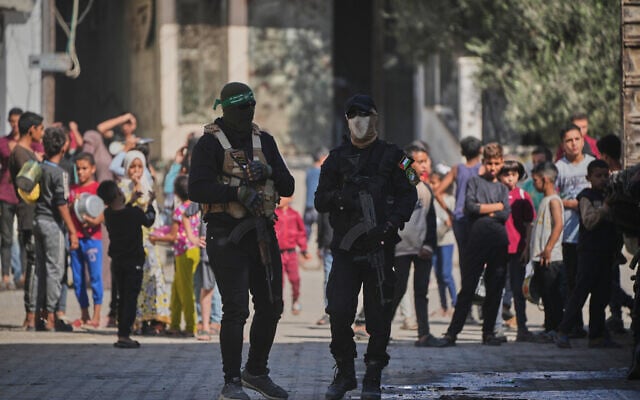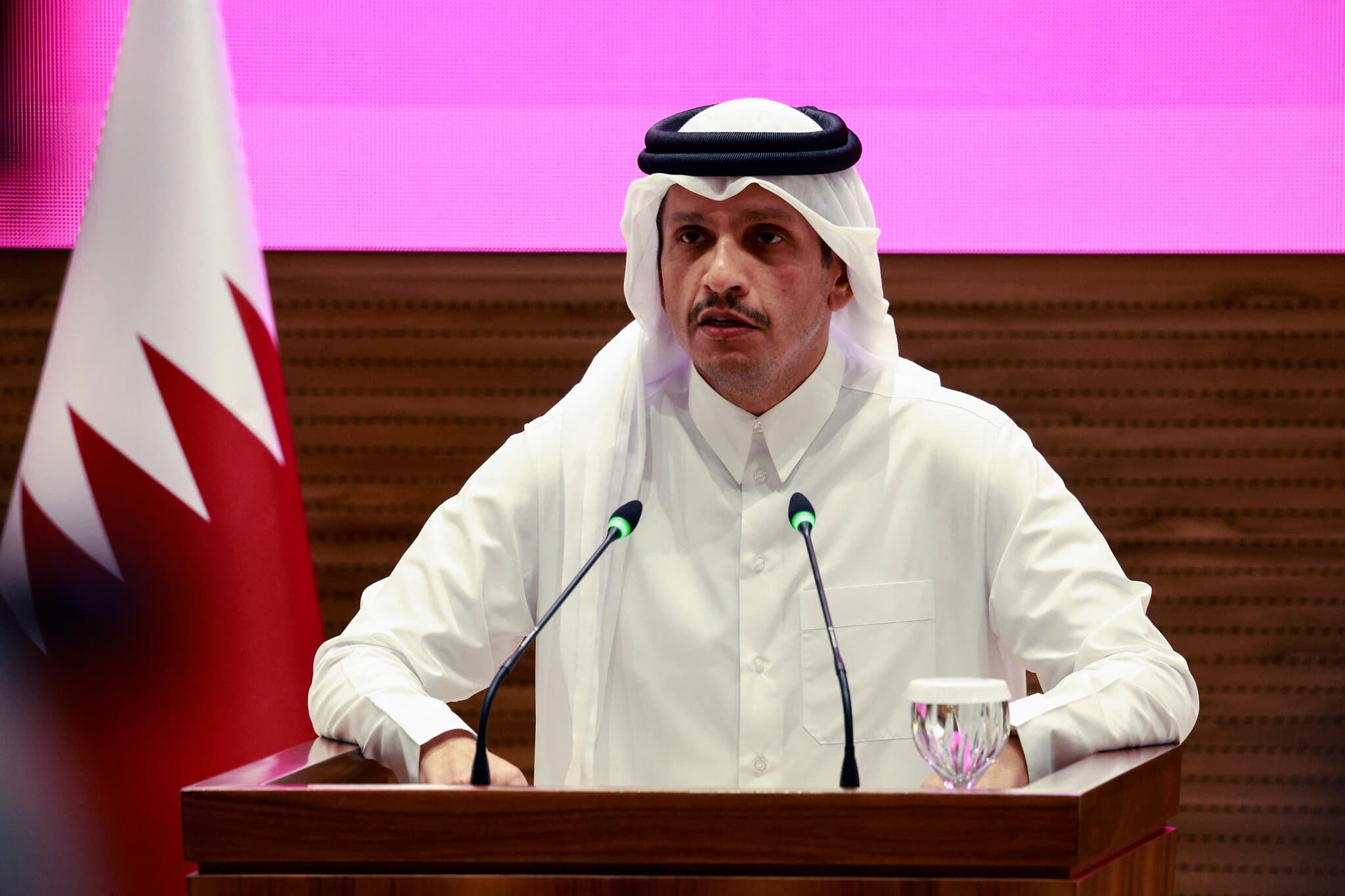Qatari Prime Minister Sheikh Mohammed bin Abdulrahman al-Thani suggested on Wednesday that Hamas violated the US-brokered ceasefire in Gaza on Tuesday when it attacked IDF soldiers and killed a reservist.
The deadly incident in the Rafah area of the southern Gaza Strip was “very disappointing and frustrating” for Qatar, said al-Thani, who was giving an onstage interview at the Council on Foreign Relations in New York City.
On Tuesday afternoon, a cell of Palestinian terror operatives targeted troops with sniper fire in Rafah’s Jenin neighborhood, killing Master Sgt. (res.) Yona Efraim Feldbaum, before following up a short while later by firing several RPGs at IDF forces.
The military responded by striking several targets in the area that posed a threat to troops, including buildings and tunnel shafts. The Israeli Air Force then conducted a wave of strikes across the Gaza Strip between Tuesday evening and Wednesday morning, with Hamas health authorities — who do not distinguish between civilians and combatants — reporting at least 104 dead, including dozens of women and children, before Israel announced that it would resume observing the ceasefire.
“What happened yesterday was a violation,” al-Thani said, acknowledging that mediators had expected Israel to respond after one of its soldiers was killed.
Pressed on who specifically was responsible for Tuesday’s “violation,” al-Thani responded, “What happened yesterday — the attack on the Israeli soldiers — that’s basically a violation by the Palestinian party.

“Hamas has put [out] a statement that they are not in communication with this group [that carried out the attack],” he said. “We don’t know yet [if that’s true].”
Clarifying further, the Qatari premier said that Hamas had offered “conflicting statements” regarding the attack on Israeli troops, with one claim being that the gunmen responsible for it “lost communication” with the Hamas leadership and “didn’t know what they were doing.” Hamas also claimed that those responsible for the violation belonged to a different group “that is not related to them.”
“It doesn’t matter for us who did what; what matters to us… is making sure that this event doesn’t… make this agreement collapse,” al-Thani said, noting that both Israel and Hamas have subsequently expressed their desire for the ceasefire to hold.
The Qatari prime minister was also asked about Hamas’s reluctance to disarm, as it is expected to, under the terms of US President Donald Trump’s 20-point plan for Gaza.
Implementing this demand, al-Thani acknowledged, will be “complex.”
“It will be a complicated process…to go through the disarmament and the decommissioning, but it’s part of the agreement,” he said, referring to Trump’s plan.
However, the agreement signed by Israel and Hamas in Egypt on October 9 only focused on the first half of that plan, which pertained to the initial ceasefire, IDF pullback, hostage-prisoner swap, and humanitarian provisions.
Nonetheless, al-Thani said that the mediators were pushing Hamas and all Palestinian factions in Gaza to “get to a point where they acknowledge that they need to disarm.”

The purpose of the disarmament goal is ensuring that both Palestinians and Israelis feel safe, al-Thani said, arguing that the way to ensure that is by “creating a political horizon for the Palestinian people.”
Qatar, which is home to some of Hamas’s top leadership, has been one of the key diplomatic go-betweens since the terror group’s devastating attack on Israel on October 7, 2023, sparked the war in Gaza.
Last month, Israel carried out a strike inside Qatar aimed at Hamas leaders who had gathered in one place to discuss a US-backed ceasefire proposal, triggering a rare rebuke of Israel by US President Donald Trump, who then pressed harder for a Gaza ceasefire.
Al-Thani called the attack — in which a Qatari security guard became the first citizen of a Gulf Arab monarchy killed by an Israeli airstrike — not only “a shock but a game-changer for all the region.”
“I think that the attack itself has shown the US that there are all the red lines being crossed in the region,” he said.
Opposition to Israel’s treatment of prisoners
At a later point in the onstage interview, al-Thani used a question regarding Israel’s refusal to release prominent Palestinian security prisoner Marwan Barghouti as an opportunity to call out the treatment of Palestinian prisoners in Israel.
He took particular issue with videos posted by far-right National Security Minister Itamar Ben Gvir in which he was seen mocking inmates, including Barghouti.
Barghouti is currently serving five life terms for planning attacks during the Second Intifada that killed five civilians in Israel. He has consistently denied the charges and rejects the Israeli court’s jurisdiction over him, as he is a member of the Palestinian Authority’s parliament.
Despite having been out of the public eye for over a decade, he remains popular among Palestinians, and many regard him as a potential successor to PA President Mahmoud Abbas. Despite many attempts by his supporters to have his term commuted, including through various hostage deals, Jerusalem has resisted the notion of freeing him.
Al-Thani tells the conference that the question of Barghouti’s release is a question for Israel, but that “there are tens or hundreds of Marwan Barghoutis in Israeli prisons who have been prosecuted and tortured and mistreated, and no one is talking about it.”
He noted that many of the Palestinians currently in Israeli jails are being held without trial, apparently referring to the several thousand incarcerated under administrative detention, and called for their release.
Without detailing what they have been accused of, al-Thani claimed that Israel has refused to release certain prisoners, even though they are very ill, “because of the symbolism of their names.”
“This is something that needs to be addressed. Israel should be held accountable for what’s happening in their prisons with the Palestinians,” the Qatari premier continued.
“I don’t know if any of you here watch that Minister Ben Gvir is doing [of] the prisoners over there. It is very inhumane, and I think that this should never be acceptable for anyone in today’s world,” he added.

